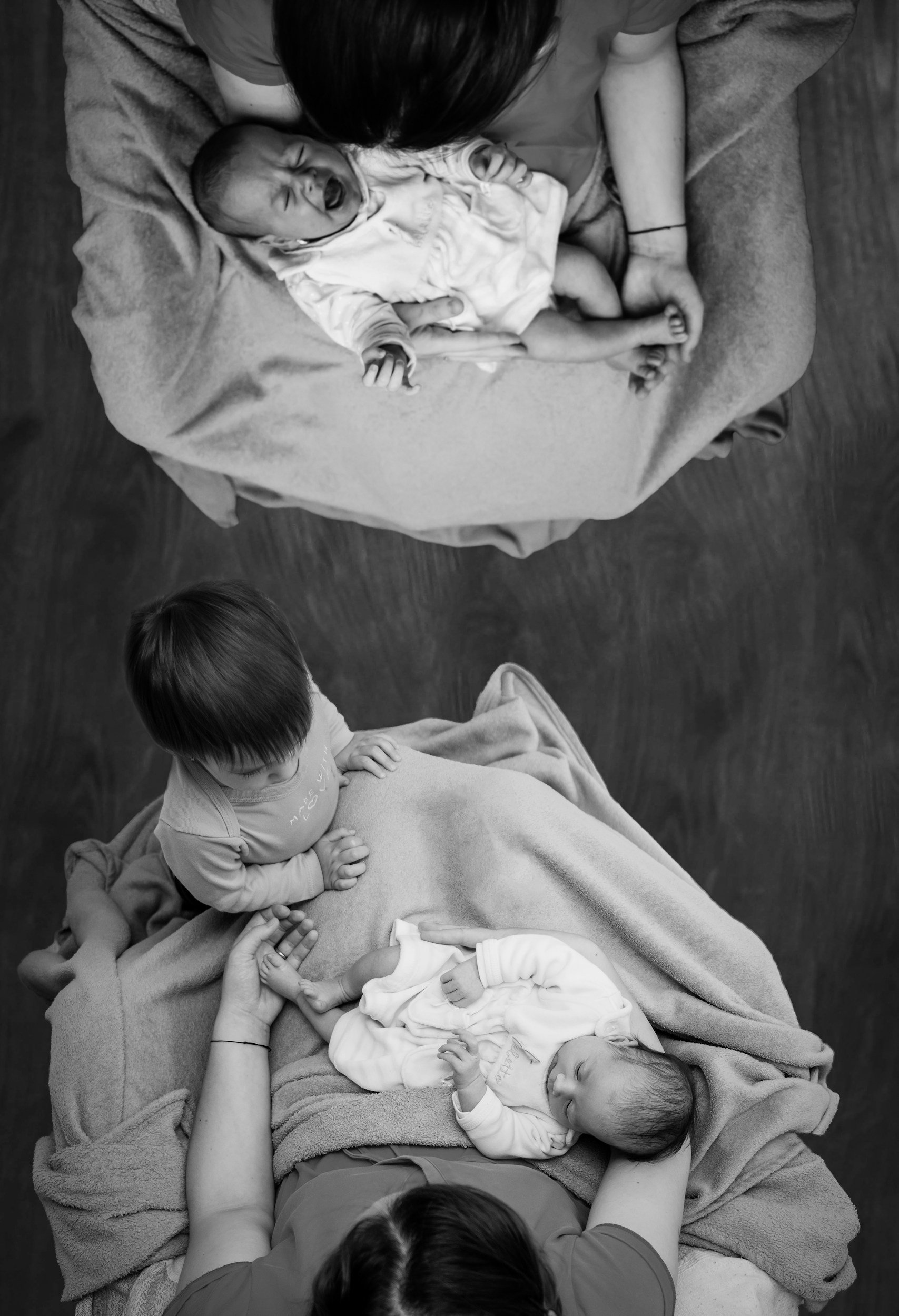I'm Rachael
Mom of 3 & Baby Sleep Expert with Big Sis Energy
& I’VE DONE ALL THE RESEARCH FOR YOU ALREADY.
Better sleep for the entire family
BROWSE COURSES
hey!
The 12-Month Sleep Regression
This blog originally appeared on GetzWell.com
Is your one-ish year old still not sleeping through the night? Join the (very popular) club! Sleep interruptions are very normal at this stage, for one simple reason: your baby isn’t such a baby anymore. They are changing, gaining new skills by the second and quickly becoming a little person with a HUGE personality.
I know you may be thinking, wait, we haven’t gotten through the 8-10 month progression! Or maybe you’re more in the — yikes, my baby’s sleep hasn’t changed at all! — camp. Both scenarios are 100% normal. I hear from parents who are going through various sleep progressions, and some babies experience them much more than others. Some will skip certain progressions entirely. There is a huge spectrum of what’s normal, and hitting a progression isn’t something to get freaked out about, just like you shouldn’t be scared if they haven’t gotten there yet. (I didn’t actually notice any changes in my son’s sleep after a year!)
What is a sleep progression?
A sleep progression is really just sleep interruptions caused by your baby’s development, specifically the maturation of their brain, physical developments, and meeting major milestones. Sleep progressions can last a couple of weeks, or sometimes up to a month or more, depending on what’s happening and how sensitive your baby is.
This may sound familiar, especially if you’ve “toughed out” baby’s 4-month sleep progression (when they were developing sleep architecture) and the 6-month sleep progression (big growth spurts, reactions to new solid foods, crawling), and yes, even the 8-10 month sleep progression (crawling and new communication skills).
Are Sleep Progressions Bad?
No! This is why I don’t like the term “sleep regression,” because “regression” can imply something really scary when you’re a parent. Regression implies that there was a skill that is now lost, and that’s not exactly accurate when we’re describing these sleep interruptions.
During sleep progressions, babies are not losing a skill. They are just rapidly adjusting to all those major first-year changes. It’s really important to link development and sleep and to adjust our expectations. For most babies sleep is never going to be linear, and it’s totally normal to experience bumps along the way!
What’s happening with your babe during a 12 month sleep progression?
At 12 months, we’re seeing BIG cognitive and physical developments for baby. Think huge bursts of active milestones, communication explosions, surges in skill acquisition, separation anxiety, and, at the same time, new-found independence.
Of course, teething and illness are still repeat sleep interruption offenders. However, for the most part, any time you see those big developmental changes happening, you can expect baby to experience some interrupted sleep.
What are the Major Signs of a 12 Month Sleep Progression?
I’ve listed a few major signs of a 12 month sleep progression, but it’s important to remember that not all babies experience these sleep progressions in the same way, or even at the same time. Babies aren’t robots! Your baby might enter a 12 month sleep progression early, or they might skip this stage altogether. Babies’ sleep happens at different rates.
-
Major Active Milestones: Your baby is probably practicing walking, cruising, and playing with toys such as balls, dolls, etc.
-
Teething: Teething is still happening. Alternatively, if your baby is a late teether, it’s likely starting now!
-
Active Responder: Baby can understand simple directions and follow a 1-step instruction such as, “Pick up the cup!” Baby will respond to familiar songs and sounds and might babble or saying a couple of words.
-
Solid Food Lover: Solid foods are well established and baby likely has favorite foods.
-
Separation Anxiety: You’re probably seeing a big spike in baby’s separation anxiety from your baby. Baby likes to be within sight and hearing of their favorite people.
-
Nap Time Battles: Baby might be fussier than usual. Around this time, they might trick you into thinking they’re ready to drop the nap! (If that happens, you might find the dropped nap is premature, leading to overtiredness.)
How to Get through a 12 Month Sleep Progression (for sleepy babies)
It’s good to keep in mind that there isn’t one magical night when things go back to how they were before. It might take some experimenting before baby makes it through this sleep progression. That’s totally normal!
-
Amp up Daytime Activities: Give baby the opportunity to move and practice their new skills. Try including plenty of outdoor time for fresh air and vitamin D.
-
Ease Separation Anxiety: Give baby extra snuggles and cuddles, and keep them close as much as possible. Try to maximize your 1:1 time with baby. If you’re going to leave them, make sure to let them know by saying, “I’m going into the kitchen now and will be right back,” or something similar.
-
Keep up the Bedtime Routine: Aim for a consistent bedtime routine. Try to create a bedtime routine that is a source of connection and calm, rather than rushing and distraction.
-
Soothe Teething Struggles: Comfort teething pain as best you can. (See my Instagram highlight!)
-
Experiment with Nap Strategies: Consider capping the morning nap to see if you can still keep baby’s afternoon nap. At 12 months, you may find that your baby can only handle 30 minutes in the morning. You might also need to push the afternoon nap a bit further, extending the first wake window. Most babies will hang onto the second nap for another few months.
-
Feeding: If your baby is still waking for a feed or two in the night, this is totally normal. You don’t need to stop if it’s working fine for you. Either way, make sure baby is still getting plenty of nutrition through breast milk or formula, along with iron-rich foods.
How to get through a 12 month sleep progression (for sleepy parents)
Sleep progressions aren’t just tough on baby. They can be hard for parents too, especially if it feels like you “just” made it through the last progression.
-
Take Care of Yourself. You have to fill your own cup before you can give to your family! Make sure you can get as much rest as possible, whether that means you’re contact napping (letting baby snooze in your arms) or practicing safe bed sharing, or incorporating a 5-minute self care routine.
-
Outsource Your Help: Outsource some jobs to your partner if you have one. Try to tag team as much as possible, whether you’re trading off the nighttime routine or taking turns with nighttime wakings.
-
Go Easy on Yourself: Now is not the time to worry about creating “bad sleep habits.” Don’t be afraid of ocassional naps in the car or in the stroller if that’s the only way to get a nap in for now.
What NOT to do during a 12 month sleep progression
During a 12 month sleep progression, you’ll want to avoid making any big parent-led changes, such as moving baby to their own room or weaning. That includes new bedtime routines, too. When families reach out to me during a sleep progression, I always ask them if they’re sure that they want to work with me during this period. Aside from sharing educational reading and the tips above, there’s not much that we can do during these big stages of upheaval!
Sleep progressions are tough, but they are also a marker of some pretty exciting changes in your baby. They are maturing and doing exactly what they need to do. Remember, I’m here to support you, and I promise: It will definitely pass!
If you’d like to talk to a pediatrician about your baby’s sleep regression, go to www.getzwell.com
Featured
When daylight saving time ends, we “fall back” one hour, meaning that sunrise and sunset will occur an hour earlier. How will this affect your baby’s sleep?
What are floor beds? When to use them? And How to use them?
binge reads
We think you'll love these
You deserve to the
baby stage, not just "survive it."
And you DON'T have to sacrifice your values, ignore your instincts, or force yourself to follow a method you don't align with just to get your baby back to sleep.
I’m here to help you create a restful, sustainable sleep environment that honors both your baby’s needs AND your own (without the stress OR the guilt!) because, no, you don’t have to choose between the two.
enjoy!
BABY SLEEP COURSES →
BABY SLEEP CONSULTS →
Wish you could help your baby sleep better without resorting to sleep training? Download my FREE guide to a good night’s sleep and learn 8 simple, science-backed tips for supporting your child’s needs.
Traditional sleep training methods don’t have to be your solution to better sleep.
SLEEP TRAINING ISN’T THE ONLY WAY TO GET GOOD SLEEP
Hey, I'm Rachael and Hey, Sleepy Baby is for parents who want to get their nights back, without sleep training their babies.
NO ONE TOLD US POD
explorING the untold truths of parenting





